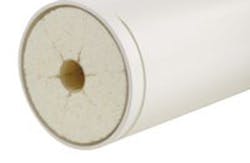A new method of purifying water by membrane has been developed by a researcher at the University of Twente in the Netherlands.
Joris de Grooth from the university's MESA+ research institute found that selective membranes in the form of thin hollow straws can improve the process, making it possible to purify water in a single step. In existing water treatment plants, preliminary treatment is always required.
According to de Grooth, the biggest benefits of the new membranes are that they can make the provision of drinking water easier and therefore cheaper, and they can improve the removal of micro-pollutants such as pharmaceutical residues.
As the University of Twente reported, surface water in the Netherlands contains increasing amounts of medicines, pesticides and hormones. It is becoming harder to produce clean drinking water with existing water treatment techniques, which were not developed to remove contaminants such as these from the water.
The new type of membrane offers one possible solution. It is applied to thin porous straws with holes of about 5 nanometers in diameter. Multiple thin layers of polymer coating (of about 2 nm thick) are applied over the holes in a process that needs no chemical solvents and can be accurately controlled. The number of layers, the density and the charge of the layers can be varied depending on the application.
Because this is cheaper than existing methods of water treatment, it could facilitate the use of smaller-scale treatment plants, so that clean drinking water becomes available to more people, for example in remote areas of developing countries.
De Grooth was recently awarded a doctorate for his research.

